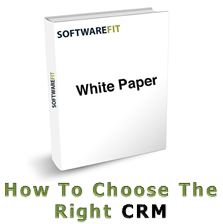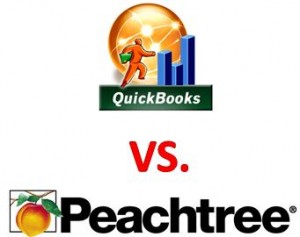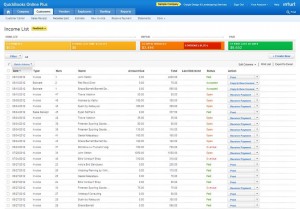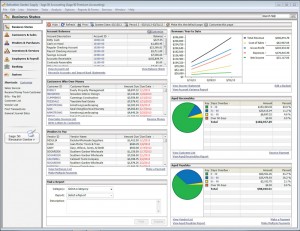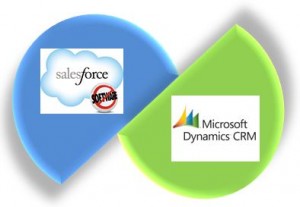
Salesforce vs. Microsoft Dynamics CRM. Two CRM companies in a versus-style comparison chart, including pricing. Have you ever wondered if either of these market giants is a good fit for your company?
Both solutions are pioneers in their own right. Salesforce has been in production since 1999 and is widely considered the most recognizable CRM platform on the market today. It has completely innovative features like chatter, AppExchange, and “Sales Cloud” – which contribute largely as to why Salesforce also sports one of the largest price tags for any CRM software.
Microsoft Dynamics on the other hand, while not quite the innovator that Salesforce is, comes equipped with equally powerful tools. Backed with the Microsoft brand, Microsoft Dynamics is able to make large strides towards the front of the CRM pack quicker than most other platforms. It also has the ability to integrate much better with other widely used Microsoft products (like Outlook), giving it a leg up against its competitors.
The features and functionality differ greatly between these two products, but the biggest divide between Salesforce and Microsoft is the price point.
We have created a ten page, no holds barred report to let you know everything these two software titans have to offer. If you want to see the differences in price, deployment, features and functionality, than download this white paper now!

Salesforce vs Microsoft Dynamics CRM
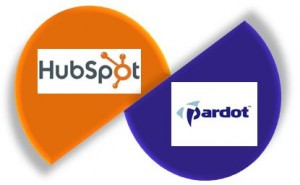
HubSpot Compared to Pardot: Versus
Compared to HubSpot, Pardot has a lot of the same marketing automation and inbound functionality. Up until five years ago, automation tools available to small and mid-sized businesses were fragmented and hard to come by. The norm was that small to mid-sized businesses looking for improved marketing strategies had to hire experts to do the work. That’s no longer the case.
Once you look over this comparison chart, feel free to check out our comparison between HubSpot and Marketo.
We are living in a revolution. Companies like HubSpot and Pardot are propelled by an appreciation for technology made available to everyone. So what are the differences of the two software suites? Download our comparison white paper below.
Both platforms provide powerful automation processes to business. Businesses who could previously not afford such large tools now have an arsenal at their fingertips. Marketing automation is an incredibly valuable tool for smaller businesses because it lets them seem bigger than they are. A small business no longer needs to hire a marketing firm to help them get their message out and improve their brand recognition.
With Marketing Automation tools like HubSpot, Pardot and Net-Results, small businesses can reach their customer base like never before.
HubSpot Compared to Pardot Software: White paper for download below.
Both HubSpot and Pardot provide solutions that make creating great and relevant content easier for small companies allowing them to become inbound marketing pros. This is why it is so important for even the smallest companies to have access to an inbound marketing solution like HubSpot and Pardot.
To read our free comparison of two market leaders in the marketing automation space: HubSpot and Pardot, click on the button below.

HubSpot vs Pardot | Feature for Feature comparison
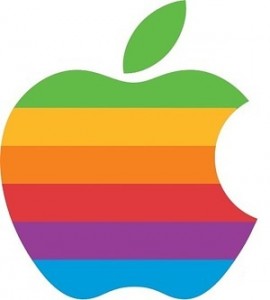
Everyone knows the computer world is divided by one defining question, Mac or PC? Users of Apple products are fiercely loyal to the brand, often owning a macbook, iPhone and iPad. So it’s no surprise the software industry has created CRM for Apple addicts to deploy specifically on Apple products.
CRM for Mac
In addition to CRM systems being customized for Apple’s operating system iOS, the SaaS movement has seen an influx of compatibility for deployment on Apple’s Safari. SaaS CRM solutions have gone further to actually customize their product to be as mobile as their customers demand, by formatting them for iPhone and iPad use.
The CRM solutions designed for iOS are great for Apple users because they almost always sync with the address book and iCal apps. They also benefit from Apple’s intuitive design layout.
CRM solutions designed specifically for iOS are often great tools for smaller companies and families. They are ideal for organization but not as robust as their SaaS counterparts. That is, by in large, a direct result of the market giants – Salesforce.com, Oracle On Demand, SugarCRM etc. offering these SaaS platforms.
Curious about which solution is right for you? We have made some charts to show you the solutions and a few of their features to get you started on your search.
CRM for iOS
| Bento |
Daylite |
Elements CRM |
Soho Organizer |
| Versatile and Affordable |
Business oriented features |
Seamless integration and sleek design |
Syncs with iCal, Mail, & Address Book |
| Intuitive iTunes layout |
Employee management focused |
Part Cloud, Part Desktop deployment |
Unique features and tools |
| $49.00 – $99.00 |
$279.95 per user |
$49-$59 per user, per month |
$99 single user, $179.00 family pack |
SaaS CRM for Apple
| SugarCRM |
NetSuite |
Salesforce.com |
Oracle On Demand |
| Quick view display, shows urgent calls and meetings |
On-the-go, optimized access to NetSuite’s integrated business suite |
Completely cloud based solution, available anytime/anywhere |
‘Oracle University’ training for Oracle on Apple, via iTunes |
| Data-sync contacts and additional info to iPad and iPhone |
Real-time dashboards and report snapshots |
Robust security keeps customer data secure |
Free email integration with Oracle CRM on Demand for Apple Mail |
| Drag and drop applications for a customized user interface |
Customer, sales and financial data with calendar management |
Rich integration capabilities with Mac-based applications via apps and synchronization tools |
Available anytime/anywhere on internet connected devices |
But that’s just the tip of the CRM iceberg, if you are seriously looking for a CRM solution and want a little help you can read our white paper ‘Choosing CRM, questions to ask and costly mistakes to avoid’ or speak with a trained software analyst by emailing
in**@so*********.com
.
